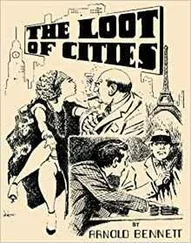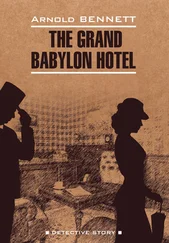Arnold Bennett - Imperial Palace
Здесь есть возможность читать онлайн «Arnold Bennett - Imperial Palace» — ознакомительный отрывок электронной книги совершенно бесплатно, а после прочтения отрывка купить полную версию. В некоторых случаях можно слушать аудио, скачать через торрент в формате fb2 и присутствует краткое содержание. Жанр: unrecognised, на английском языке. Описание произведения, (предисловие) а так же отзывы посетителей доступны на портале библиотеки ЛибКат.
- Название:Imperial Palace
- Автор:
- Жанр:
- Год:неизвестен
- ISBN:нет данных
- Рейтинг книги:4 / 5. Голосов: 1
-
Избранное:Добавить в избранное
- Отзывы:
-
Ваша оценка:
- 80
- 1
- 2
- 3
- 4
- 5
Imperial Palace: краткое содержание, описание и аннотация
Предлагаем к чтению аннотацию, описание, краткое содержание или предисловие (зависит от того, что написал сам автор книги «Imperial Palace»). Если вы не нашли необходимую информацию о книге — напишите в комментариях, мы постараемся отыскать её.
Imperial Palace — читать онлайн ознакомительный отрывок
Ниже представлен текст книги, разбитый по страницам. Система сохранения места последней прочитанной страницы, позволяет с удобством читать онлайн бесплатно книгу «Imperial Palace», без необходимости каждый раз заново искать на чём Вы остановились. Поставьте закладку, и сможете в любой момент перейти на страницу, на которой закончили чтение.
Интервал:
Закладка:
“You’re frightfully kind,” said she. “I’ll just——”
“How did you know I’m never tired?” he interrupted her.
“I could see it in your shoulders,” she answered. “You aren’t, are you?”
“Not often,” he said, proud, thrilled, feverish.
“See it in my shoulders,” he thought. “Odd little creature. Her brain’s impish. That’s what it is. Well, perhaps she can see it in my shoulders.” Indeed he was proud.
“I’ll just fly upstairs one moment. Shan’t keep you. Where’s the lift?” But she had descried the lift and was gone.
“Reyer,” he called. “Just see Miss Savott to her suite.”
Reyer ran. The liftman judiciously waited for him.
And Evelyn, Nizam of the immense organism of the hotel, reflected like an ingenuous youth:
“I know everyone thinks I’m very reserved. And perhaps I am. But she’s got right through that, into me. And she’s the first. She must have taken a liking to me. Here I’ve only known her about six minutes and she’s——” Somewhere within him a point of fire glowed. He advanced rather self-consciously towards the waiting Cradock. And, advancing, he remembered that, on her first disappearance, after saying she would be two minutes, Gracie Savott had been away only half a minute. She was not the sort of girl to keep a man waiting. No! . . . But barely half his own age.
Chapter III – THE MEAT-BUYER
I
Jack Cradock’s age was fifty-nine. He was short, stoutish, very honest, and very shrewd. His clothes were what is called ‘good,’ that is to say, of good everlasting cloth well sewed; but they had no style except Jack’s style. His income nearly touched a thousand a year. With his savings he bought house-property. No stocks and shares for him. He had as fine an eye for small house-property as for a lamb’s carcass. He had always been in the Smithfield trade. His father had been a drover when cattle strolled leisurely to London over roads otherwise empty. He went to bed at eight o’clock, and rose at three—save on Sundays. Daylight London seemed to him rather odd, unnatural.
He had been meat-buyer to the hotel in the years when it was merely a hotel among hotels, before Evelyn took control of it. In those years there existed in the buying departments abuses which irked Jack’s honesty. He saw them completely abolished. He saw the hotel develop from a hotel among hotels into the unique hotel, whose sacred name was uttered in a tone different from the tone used for the names of all other hotels. He recognised in Evelyn a fellow-devotee of honesty in a world only passably honest; a man of scrupulous fairness, a man of terrific industry, a man of most various ability and most quiet authority, a real swell. Jack had heard that Evelyn gave lectures on wines to his own wine-waiters, that he tasted every wine before purchase, and chose every brand of cigar himself; and Jack marvelled thereat. He had heard, further, that Evelyn knew everything about vegetables; but Covent Garden, which he regarded as a den of thieves, had no interest for Jack. Apart from potatoes and occasional broad beans and spring onions, he never ate vegetables; salads he could not bear.
Of course Evelyn did not know as much about meat as Jack—who did?—but he knew a lot, and he did not pretend to more knowledge than he possessed. That was what Jack liked in Evelyn: absence of pretence. He adored Evelyn with a deep admiration and a humble, sturdy affection equally deep. Evelyn often asked after his wife, and the boy in the navy.
He was now waiting for his august governor with impatience well concealed. He saw Gracie run off to the lift. He himself had never been in any but the service-lifts. He had never seen the restaurant except when it was empty and the table-tops dark green instead of white, and the chairs packed; but he knew the restaurant-kitchen, and had frequent interviews with the gesticulatory and jolly French chef in the chef’s office outside whose door two clerks worked. He had never been in any bedroom. He imagined all manner of strange and even unseemly happenings in the suites. He rarely had glimpses of the hotel’s clientèle, and his shrewd notion was that he would be antipathetic to it. Still, it wanted the best meat, and he provided the best meat; and that was something. He strove conscientiously to think well of the clientèle.
He did not like the look of Miss Gracie Savott. She coincided too closely with what he would describe in his idiom as ‘a bit too tasty.’ He was aware that women, more correctly ladies, smoked, but he objected to their smoking, especially the young ones; his married daughter, nevertheless a fine and capricious piece, did not smoke, and had she attempted to do so would probably have been dissuaded from persevering by physical violence at the joint hands of her father and her husband. As a boy he had seen ancient hags smoking short clay pipes on the house-steps of large villages. A hag, however, was a hag, and a cutty pipe suited her indrawn lips. But that a fresh young girl, personable, virginal, should brazenly puff tobacco—that was different.
Nor could he approve of Gracie’s general demeanour towards the governor. Too bold, too insinuating, too impudent! Hardly decent! Most shocking of all was the spectacle of Gracie daring—daring to paint and powder her saucy face in the presence of the governor. Shameless! And the governor tolerated it! If the governor had not been above all criticism Jack would have ventured in his heart to criticise the demeanour of the governor towards Gracie. Too boyish, too youthful; a hint of the swain about it! Well, the chit was gone now.
II
The governor strolled slowly down the hall to the doors where Jack stood waiting. A little self-conscious, the governor was, in his walk. Seldom before had Jack seen the governor self-conscious. His confidence in the governor was a great solid rock. He felt a momentary tremor in the rock. It ceased; it was not a tremor; it was imperceptible: he had been mistaken. Yet . . .
“Morning, Jack. Sorry to keep you. Shan’t be a minute.”
“Morning, governor. No hurry, but we ought to be getting along. I have a taxi waiting.” The customary tranquil benevolence of the governor’s tone reassured him.
“Just tell me again about that Jebson young man. I want to know exactly before I see him. You said he’s only recently come into the business.”
“Yes, sir,” Jack began. “And if you ask me, he thinks he’s the emperor of Smithfield. His uncle’s a tough ’un, but nothing to young Charlie Jebson. I get on pretty comfortably with everybody in the markets except him. Tries to make out he don’t care whether he does business or not. But he can’t put that across me. No! And everybody but him knows he can’t. His uncle knows it. Ten shilling a stone’s the right price for the best Scotch. And Charlie knows that too. But ‘ten and six,’ he says. ‘Ten and two,’ I say, wishing to meet him. ‘Ten and two! You’ve got the b. ten and two fever, Cradock,’ he says. ‘And you’ve got the b. half-guinea fever,’ I says. ‘Don’t ask me to come back,’ I says. ‘Because I shan’t. I’ve got my best coat on,’ I says. Then he turns on me and gives me a basinful, and I give him one. Nothing doing, governor. And his uncle’s afraid of him. It was all over the Market.”
“Well,” said Evelyn, with a faint, mild smile. “We’ll give him a miss in future.”
“Yes, governor,” said Jack anxiously. “But supposing he takes it, supposing he accepts of it! Jebsons have the finest Scotch beef in the market. It was Charlie’s grandfather as started the Scotch beef trade in Smithfield. And the best Scotch—it’s none so easy to come by. Sometimes three days and I don’t see a side I fancy—not what you may call the best.”
Читать дальшеИнтервал:
Закладка:
Похожие книги на «Imperial Palace»
Представляем Вашему вниманию похожие книги на «Imperial Palace» списком для выбора. Мы отобрали схожую по названию и смыслу литературу в надежде предоставить читателям больше вариантов отыскать новые, интересные, ещё непрочитанные произведения.
Обсуждение, отзывы о книге «Imperial Palace» и просто собственные мнения читателей. Оставьте ваши комментарии, напишите, что Вы думаете о произведении, его смысле или главных героях. Укажите что конкретно понравилось, а что нет, и почему Вы так считаете.












